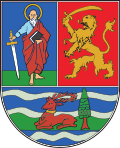| | |||||||||||||||||||||||||||||||||||||||||||||||||||||
| |||||||||||||||||||||||||||||||||||||||||||||||||||||
All 120 seats in the Assembly of Vojvodina 61 seats needed for a majority | |||||||||||||||||||||||||||||||||||||||||||||||||||||
| Turnout | 50.23% ( | ||||||||||||||||||||||||||||||||||||||||||||||||||||
|---|---|---|---|---|---|---|---|---|---|---|---|---|---|---|---|---|---|---|---|---|---|---|---|---|---|---|---|---|---|---|---|---|---|---|---|---|---|---|---|---|---|---|---|---|---|---|---|---|---|---|---|---|---|
This lists parties that won seats. See the complete results below.
| |||||||||||||||||||||||||||||||||||||||||||||||||||||
  |
|---|
Provincial elections were held in Vojvodina on 21 June 2020. [1] Initially organised for 26 April 2020, [2] they were postponed by a state of emergency due to the COVID-19 pandemic in Serbia. [3]
